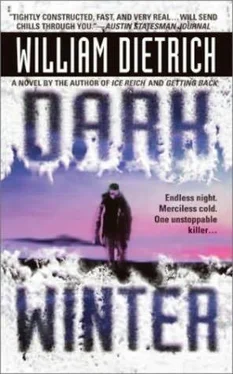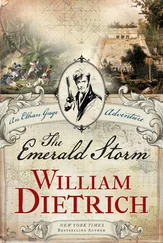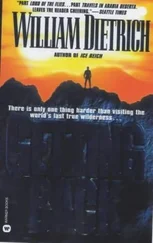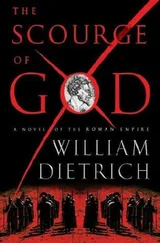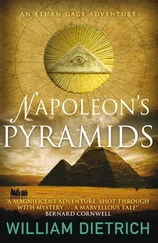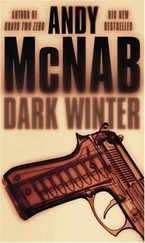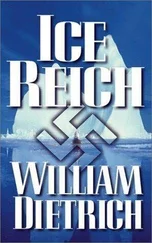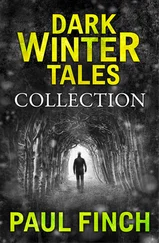William Dietrich - Dark Winter
Здесь есть возможность читать онлайн «William Dietrich - Dark Winter» весь текст электронной книги совершенно бесплатно (целиком полную версию без сокращений). В некоторых случаях можно слушать аудио, скачать через торрент в формате fb2 и присутствует краткое содержание. Жанр: Триллер, на английском языке. Описание произведения, (предисловие) а так же отзывы посетителей доступны на портале библиотеки ЛибКат.
- Название:Dark Winter
- Автор:
- Жанр:
- Год:неизвестен
- ISBN:нет данных
- Рейтинг книги:3 / 5. Голосов: 1
-
Избранное:Добавить в избранное
- Отзывы:
-
Ваша оценка:
- 60
- 1
- 2
- 3
- 4
- 5
Dark Winter: краткое содержание, описание и аннотация
Предлагаем к чтению аннотацию, описание, краткое содержание или предисловие (зависит от того, что написал сам автор книги «Dark Winter»). Если вы не нашли необходимую информацию о книге — напишите в комментариях, мы постараемся отыскать её.
Dark Winter — читать онлайн бесплатно полную книгу (весь текст) целиком
Ниже представлен текст книги, разбитый по страницам. Система сохранения места последней прочитанной страницы, позволяет с удобством читать онлайн бесплатно книгу «Dark Winter», без необходимости каждый раз заново искать на чём Вы остановились. Поставьте закладку, и сможете в любой момент перейти на страницу, на которой закончили чтение.
Интервал:
Закладка:
Lewis nodded.
"Second, we're marking the most frequently used routes with flags." He pointed to long poles with pennants on the end. "In the dark that's coming you just follow one flag to another to get back to a building. One route goes to astronomy, which the beakers call the Dark Sector because lights aren't allowed out there: It screws up their telescopes. Everyone else calls it the Dark Side. Another goes to Clean Air, where you'll work. It's away from the generators and any air pollution. A third goes to Summer Camp, which is shut down now." He pointed at distant buildings. Summer Camp was a row of Korean-War-vintage canvas Quonset huts. "A branch goes to Bedrock, those little blue huts there. That's our emergency shelter if anything goes wrong in the dome."
"Goes wrong?"
"Fire. Generator failure. Battery explosions. Well poisonings. The usual." He smiled.
Cameron also pointed out antenna towers, telescopes, construction materials, supply crates, drifted-over vehicles, and random jetsam, everything raw and jutting from the snow like the debris of some midair collision. Lewis thought the place looked like a dump but wasn't surprised. All the treeless places he'd worked in had the same look: Where could you hide the mess? The chaos represented logistical evolution.
"Third, pay attention to your body. It's sort of like being an astronaut where you pay attention to your air. Are you staying warm? Are you still alert? Are you losing energy? If you start to feel frozen, get back inside for a while. Capisce?"
"Yeah. Common sense."
"You'd be amazed how quickly that can disappear around here."
Lewis looked out at the foggy horizon. "How far can we see?"
"About six miles, three in each direction. A few more if you get up on a tower."
The sun was low, a white disk behind fog like a dim headlight. It circled the horizon every twenty-four hours, each day settling lower, like a marble rolling down a funnel. On March 21 it would be gone.
"You been to The Ice before, Rod?"
"Four times."
"So you like it."
"I love it."
"Even the Pole?"
"Especially the Pole. It's like no place else on earth. Come on, I'll show you."
They started walking toward the astronomy complex that squatted three-quarters of a mile away, crossing the ice taxiway. Just beyond was a stake jutting two feet out of the snow.
"Here it is. Go ahead, walk around the world."
"This is the South Pole?"
"Yep. Bottom of the planet. When it gets dark I come out here sometimes on a clear night and lay down to watch the stars and the aurora. Sometimes I do feel upside down, like I'm about to float off and drift into the sky. It's spectacularly beautiful then, and the vertigo makes me high."
"I thought the Pole would look like something more."
"In summer there's a ceremonial pole over there." Cameron pointed vaguely. "We took it down for the winter a couple weeks ago. It looks like a Santa Claus pole- you know, with barber stripes and a silver globe on top? We put the flags of the Antarctic treaty nations around it and the VIPs who fly in for a few hours pose for pictures. But this stake is the real pole. The ice cap moves, flowing toward the sea, so every January we have to drive a stake about ten meters from the last one to keep pace." He pointed out a line of older stakes marching away across the snow, marking where the Pole had been. "Eventually the dome will roll right over it, except maybe we can win funding for the new base and the dome will be dismantled."
"Everybody needs money," Lewis recited. He trod a circle around the stake. "Around the world. I read that Admiral Byrd said it was the middle of a limitless plain. You get here, and that's all. He said it was the effort to get here that counted."
"That, and getting away. But Byrd said that back in the 1920s, way before the base started in '58. Nowadays it's the staying that counts. We're here for a purpose. Your job is important. Mine is important. They're all important. Scientifically. Politically. We're at a place that no single nation owns, dedicated to knowledge. I think that's pretty cool."
"Cool." Lewis brushed the frost on the ruff of his hood.
"You know why people like it down here, Jed?" Cameron was looking directly at him, but with the goggles on the effect was odd, like being looked at by an insect.
"Why?"
"Because the purpose of life is to learn. That's why we exist, to learn. That's my belief, anyway. That's why the station exists. Moss and Adams and Mendoza have the world's best window on space. Jerry Follett and Dana Andrews are deciphering the atmosphere. Hiro and Alexi are trying to understand the aurora, which is one hell of a show. You do climate, Lena hydroponics… it doesn't get any purer than this."
The hood against Lewis's ears made everything like listening through a blanket. "So how do we tell direction down here?"
"We make our own grid. The Greenwich Meridian is grid north; the opposite way south. Mostly, though, we point. There's nowhere to go, so it's like being on a small island. Disneyland. Come on, let's go see where you'll work."
They trudged toward the Clean Air Facility, a brown metal box a half mile from the Pole. It was elevated on stilts and festooned with instruments and antennas. As they walked, Lewis felt as if he'd gained a hundred pounds. His feet felt hot and heavy and his lungs were unhappy with air that remained too thin, too dry, too cold. His neck gaiter had become a muffler of ice, scratchy and smothering. He swatted at it, breaking some bits loose, but more clung to the fabric. At the same time he realized he was sweating.
The snow squeaked as they walked, dry and powdery, a loose coverlet on harder blue-white ice. Wind blew this skin into small, shin-high drifts that Cameron called sastrugi. "Alexi says it's the Russian word for eyebrows." It was laborious to lumber over or through them.
"What's his story?"
"There's no money in Russia. He's one of the top aurora experts in the world. So we gave him a posting here."
"He said he liked that movie The Thing."
"I think there's something in that film that gets to our ex-Commie. The fact that no one can trust anyone. I think he was into some pretty heavy science politics in the old Soviet. Down deep he's pretty serious, you know, kind of quietly ambitious. He'd love to accomplish something down here to bring credit to Mother Russia. Point of pride to bring out something new. But he's also a lot of fun. So's Hiro."
"They the only foreigners?"
"Dana's a Kiwi and Lena emigrated from the Czech Republic, but nobody's a foreigner, not down here. Antarctica is the only place on earth where you don't need a passport and you don't go through customs. No single nation owns anything. That's pretty cool, too."
There was the distant chug of the generator but no other sound. No bird call, no rustling leaves, no distant shout of children, no drone of highway noise. Lewis pushed back his hood and pulled down his gaiter a moment to listen, ignoring the bite of cold, his exhalation a puff of steam.
There was a quiet whisper behind him.
He turned his head. No one there.
They kept walking, puffing over the drifts.
Again the whisper.
Lewis turned completely this time. Odd. The snow was empty. What the hell?
The station manager was watching him with amusement.
"I thought I heard something."
"It's your breath, fingie. The moisture freezes as you walk and crackles behind your ear as it sprinkles down. Weird, isn't it?"
"My breath?"
"The vapor cloud."
"Oh." He puffed and listened as his exhalation floated away like fairy dust, with an audible crinkle. "You notice the noise," he conceded. "There's nothing else to hear."
"Just the voices in your head."
An outside metal staircase led up to the Clean Air Facility, perched on its columns like a heavy bird. Inside were instruments he'd been briefed on at Boulder by NOAA. Windows looked out at the flat bleakness of the ice cap. The elevated structure was here because air at the South Pole was thousands of miles from human industry, and hence the most unpolluted on earth. Lewis's primary job was to sample that air for evidence of global warming. He actually had to keep track of thirty-five separate measurements, some of them automated and some requiring manual sampling of air, snow, sunlight, and atmospheric ozone: temperature, carbon dioxide concentrations, wind, snowfall, pollutants, barometric pressure. My job is important. If the planet was heating, it would perversely show up here first, just like the ozone hole had. If their ice plateau melted, it would drown the world's ports. Antarctica was a global trip wire, warning humans if industrialization had gone too far. Jed Lewis was this winter's Paul Revere.
Читать дальшеИнтервал:
Закладка:
Похожие книги на «Dark Winter»
Представляем Вашему вниманию похожие книги на «Dark Winter» списком для выбора. Мы отобрали схожую по названию и смыслу литературу в надежде предоставить читателям больше вариантов отыскать новые, интересные, ещё непрочитанные произведения.
Обсуждение, отзывы о книге «Dark Winter» и просто собственные мнения читателей. Оставьте ваши комментарии, напишите, что Вы думаете о произведении, его смысле или главных героях. Укажите что конкретно понравилось, а что нет, и почему Вы так считаете.
